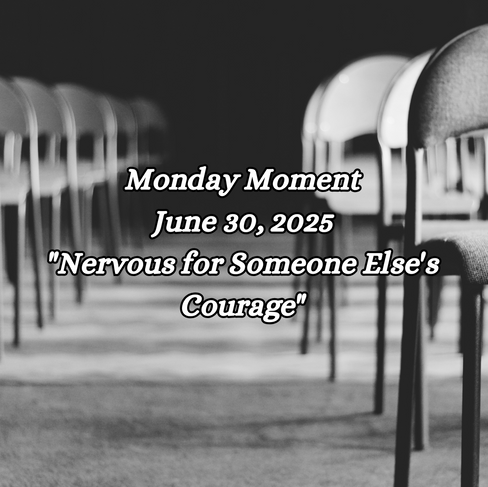Sunday, July 6, 2025
Gwendolyn Glover DeRosa (she/her)
Director of Student Ministries, King Avenue UMC (Columbus, OH)
Queer Christian
Then people brought little children to Jesus for him to place his hands on them and pray for them. But the disciples rebuked them. Jesus said, “Let the little children come to me, and do not hinder them, for the kingdom of heaven belongs to such as these.” When he had placed his hands on them, he went on from there.
(Matthew 19:13-15 NIV)
What are some of your hobbies? The kinds of things you do just for fun, just for yourself? As someone who works in ministry and whose free time is spent in LGBTQIA+ advocacy, I was neglecting my self-care and mental health for years. So, I made a really specific goal to do something just for myself and so I joined a group of non- church, non-ministry friends for a Dungeons and Dragons (DnD) campaign last year. If you don’t know what DnD is, you are not alone. I always thought I would not like DnD because I am not a game person.
Even though I’m a big nerd, it’s actually difficult for me to understand the complicated rules of games and I’m just not competitive at all.
I didn’t realize that DnD is a group storytelling game. And I love stories! I identify most of all as a storyteller.
In a DnD campaign, all of the players are on a quest together. No one player is better or more important than the other players. Everyone is equal in the game.
Everyone is needed. Everyone matters.
One of the first campaigns I played in was a story about King Arthur and the Knights of the Round Table. I played a Queer female knight named Sir Brigid. I was so excited to play this game because I’ve always loved the legends of King Arthur and the Round Table.
Do you know why the table was round?
It’s because there was no hierarchy in Camelot. Everyone had an equal and valued place at the table.
This was the kind of kingdom (or kin-dom) that Jesus talked about to everyone. But when people heard about this kingdom, they were confused. Everything about this kingdom was turned inside out and upside down. The last shall be first, and the first shall be last? What did that really mean? Who was in charge? Who was prioritized? What held the power in this kind of kingdom?
People seem to quite naturally make hierarchies in society. They categorize people and put
them kind of on a ladder, where the most powerful are at the top and the least powerful are at the bottom. They say that rich people are more important than poor people. They say that adults are more important than children. They say that being faster, smarter, popular…whatever…makes a person matter more in society.
But God’s kin-dom is the opposite. The most vulnerable folks are kept safe. The quiet voices are listened to. The poor are prioritized. The gentle and humble, the small, the slow, these are the ones that lead us when we are living into the kin-dom of God.
Let’s pray: Hi, God! Thank you for the gift of storytelling. Stories, like the ones that Jesus told, show us what it’s like to be part of your kin-dom. Help us to dismantle systems of hierarchy in our daily lives. And may we make space for the marginalized in our lives every day, for that is where you will be found. Amen.
Reflection
I wonder what this kind of kin-dom might look like to you.
I wonder how we might prioritize the people society puts at the bottom of the ladder.
I wonder how we can make space for those voices today.
Action:
Learn about, get involved with, and support community care organizations locally. Here
are a few in Central Ohio that I recommend:
• Heer to Serve https://heer2serve.org
• Star House https://www.starhouse.us
• Stonewall Columbus https://stonewallcolumbus.org
• TransOhio https://www.transohio.org










